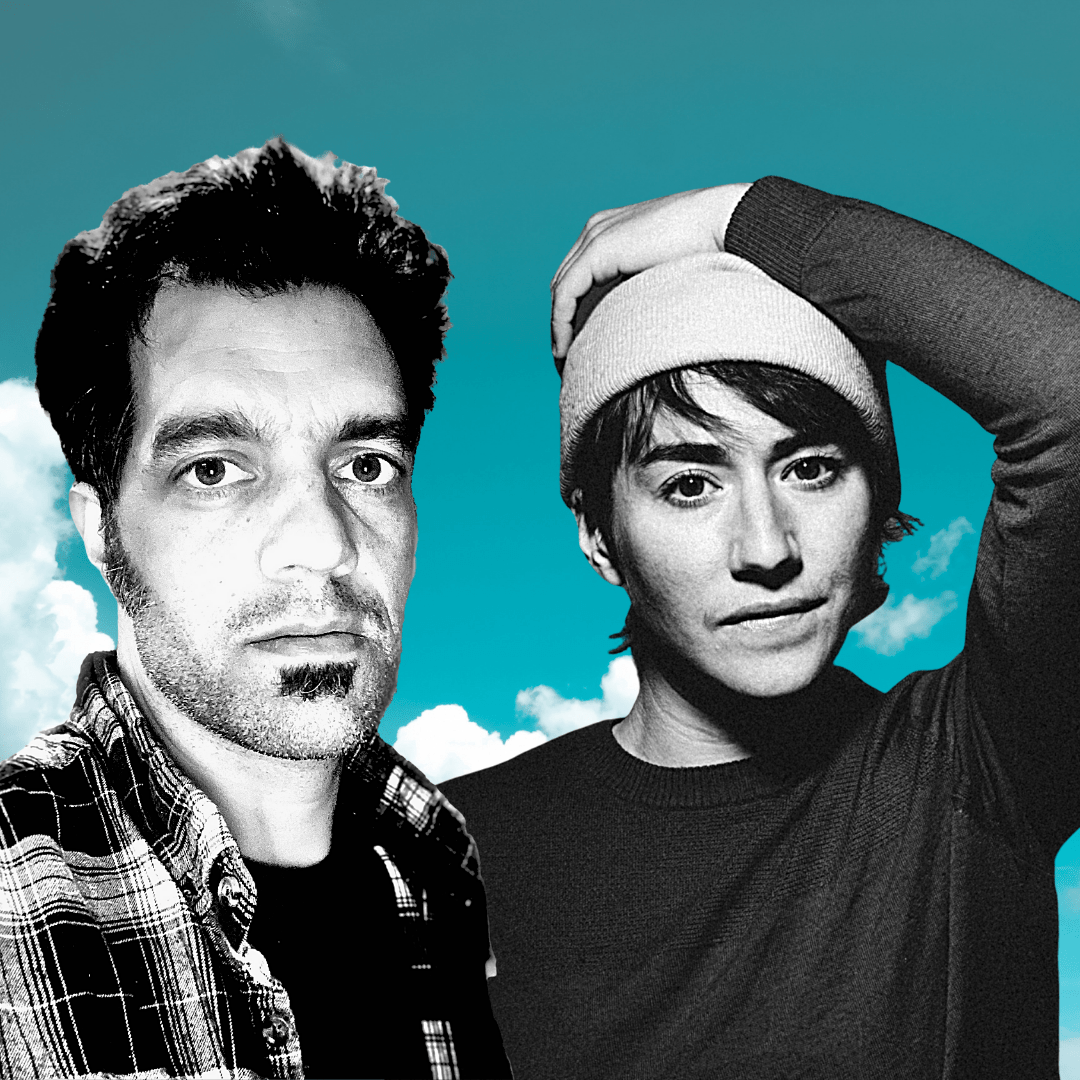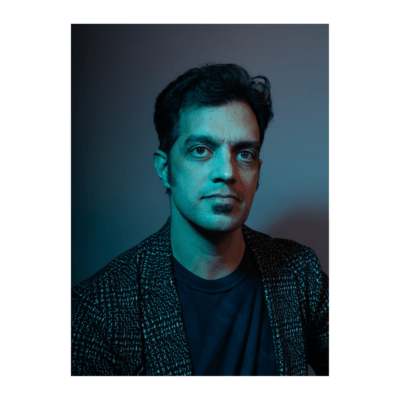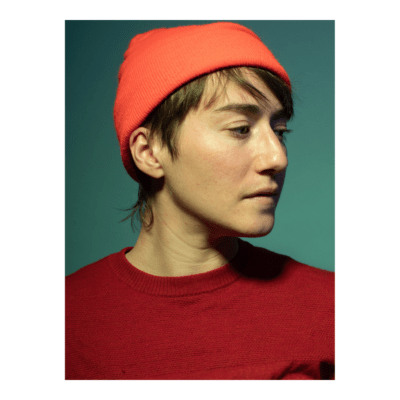Advertisement
The Cosmic Connection Of Neo-Folk Duo Cloudbelly

The first thing you notice when talking to Cloudbelly — the Western Massachusetts duo of Corey Laitman and Anand Nayak — is that they’re not exaggerating when they say they’re on the same wavelength, often finishing each other’s sentences.
That palpable chemistry is part of their charm, and they had me smiling throughout a recent phone interview. It’s a magnetic connection they first felt one night at Luthier’s Co-op in Easthampton — the two performed separately and promptly fell in love with each other’s music.
They felt it when, putting their heads together for a band name, they immediately agreed on naming themselves after a family pet. And when coming up with the album title, “Thou/Them.”
They created their first album while quarantined in separate homes last year — Nayak lives in Northampton; Laitman in Turners Falls — trading tracks back and forth, building off each other, song by song.
The resulting “Thou/Them,” a lo-fi neo-folk anxiety-balm, shimmers with shades of Joni Mitchell in Laitman’s vocals, and an overall dreamy Cowboy Junkies Zen-out vibe. The album is set to release this fall from Signature Sounds; the single “Crayon” is a solid example of their sound — an eye-catching music video directed by Piper Preston accompanies it.
Born in Pune, Maharashtra, India, Nayak’s parents moved to Boston when he was 2; he grew up in Belmont. The guitarist-producer and his wife moved to Northampton in 2000. He earned a Grammy nod for producing Alastair Moock's 2013 children’s album, “Singing Our Way Through: Songs For The World's Bravest Kids.”
Singer-songwriter Laitman grew up in Bedford, New York, and performed in New York City before moving to the Berkshires in 2013. (“I fell in love with somebody who lives in Western Mass., and I never left. I just kept falling in love,” Laitman says.)
I caught up with Cloudbelly recently, during a rehearsal in Chicopee, as they ready to kick off a series of performances, including a Club Passim livestream on June 6 — their second performance ever as a band — and an in-person show at the Northampton Farmers’ Market June 8 with 9-year-old singer-songwriter (and Laitman’s mentee) Louie Phipps.

Lauren Daley: Anand, what did you notice about Corey the night you met at Luthier’s Co-op?
Anand Nayak: The lyrics of the songs, the melody, Corey’s voice. The way they were delivering it to the audience, it was so believable. You don’t often see that.
Corey was playing with a duo — Sean Kimball was playing upright bass. Some months passed, Corey and Sean had been working on a record; I came in to record some guitar. It became Corey’s 2018 release “Seafoam.” It wasn’t until the pandemic that we were like, “Hey let’s call this a thing.” I happened to have the name “Cloudbelly” sitting in my pocket because I’d had a parakeet, a little fellow my family and I named Teddy Thomas Cloudbelly. I was like, “How about Cloudbelly?” And Corey was like, “Yup.”
Nayak: [to Corey Laitman] I think you were also going to suggest it in fact.
Corey Laitman: Yeah. I wonder if you have relationships like this, Lauren, but it happens often between us that we choose the same word. There will be this pause as we’re both reaching to describe something, and then one of us will say the word that’s in the other one’s mind. I don’t know what it’s affirming of — it’s just affirming.
Advertisement
Corey, what did you notice about Anand that night?
Laitman: That he made everything more beautiful. My friend Ana had come to see my band. Both Ana and I were completely crushing on Anand. We were like, “who the f--- is that guy?”
This very handsome gentleman playing this incredibly sensitive skillful music. Anand’s just looking into the middle distance. We were just having a moment in the presence of Anand.
Nayak: I can handle this.
Laitman: [laughs] I played and afterwards [to Nayak] you just walked up — “Hey, need a guitar player? I’d love to play with you.” That’s what happened.
Nayak: That’s what happened. And it’s incredibly energizing to make music in that atmosphere of trust and love. I think that’s what made us both look at what we’re doing and say, “Let’s do this. Let’s make this a thing.”
So you started working on your album in 2019, and then the world went crazy.
Nayak: Did it? I didn’t notice. What happened?
[laughs] So you worked remotely. Did you write together?

Laitman: I write the songs and send them to Anand. The way I describe it is that I build these jungle gyms, or these skeletons, that Anand will animate with his guitar playing and all the musical decisions that he makes. He makes them so much richer.
Nayak: Something I’ve gravitated to in music is this role of responding to someone’s work, offering my work as a response. It’s like coloring things in, to give them depth and shape. It’s something I love doing, and it’s not often I’ve had the opportunity to do this kind of thing with someone else’s material, stepping into this role as co-creator. I played in a band for a long time and --
Laitman: The arrangements are tight.
Nayak: Cloudbelly is more, whatever I can think of --
Laitman: Is fair game.
Why the title “Thou/Them?"
Laitman: I identify as trans nonbinary. My pronouns are they/them. We were having a stoned-but-not-actually-stoned conversation of: everyone contains multitudes, and how universal so much of human experience actually is, and we need to have more of an imagination about the inner lives of other people. And --
Nayak: As I recall, I think we figured everything out.
Laitman: I think you came up with “Thou/Them?”
Nayak: I’m not sure which way it went. One person said “They/Them” and the other person said “Thou/Them,” and we were like, “Yeah.”
Laitman: I referenced "I and Thou" by this philosopher Martin Buber, where he talks about how sacred it is to be a person, and to know people, and to be present.
Part of what the transgender movement is about is acknowledging that being a person is much more than the small diagrams we’ve been given as instructions on how to be a person. Using the pronouns “they/them” indicates that. I’m not “he” or “she,” I’m not these rout concepts; I’m something else.
Was there a message you had in naming the album?
Nayak: Not so much a message, as a claiming of the beauty of the philosophical space around those words, what they mean specifically here, and what they could mean to anybody. To think of yourself as a person who has permission to be in contradiction with yourself. All of the ways in which we’re all divided.
It feels like something the music also goes for. We had a great text conversation in which we were talking about each song and what it meant, and there’s no way that either of us is going to be quite as erudite as we were then.
Laitman: No.
Nayak: Honestly, the thing that, as much as the sound, defines the record is the way each song gets into that inner space where things can get strange and self-contradictory. Some of the songs have a very --
Laitman: Lo-fi.
Nayak: Yeah, this great there-was-a-tape-recorder-on-in-the-room informality that I loved working with. Studio recordings can be great, but there’s a lot of atmosphere that studios are designed to keep out. And sometimes they can keep out some of the emotional atmosphere around a song, too. Ideally, a recording is a great piece of candid photography: this moment of performing a song. It doesn’t have to be cleaned up or airbrushed. It can just be what it is.
This interview has been edited and condensed for clarity.

